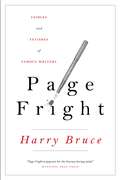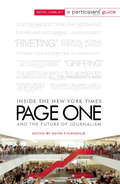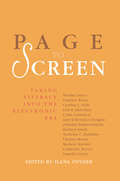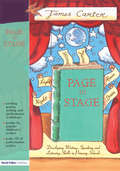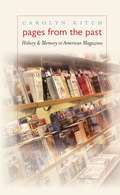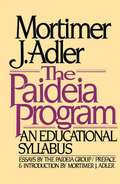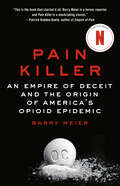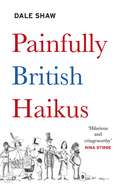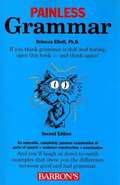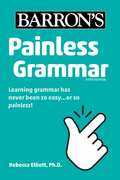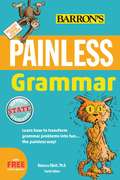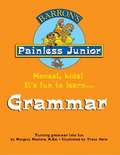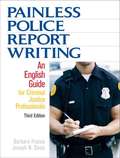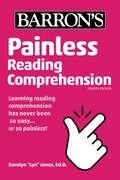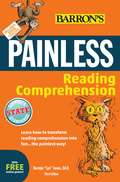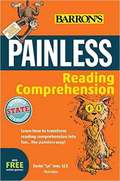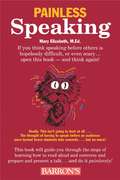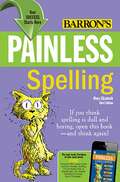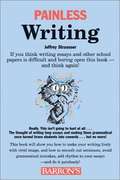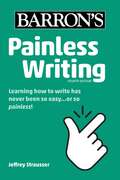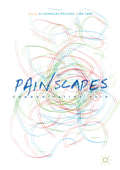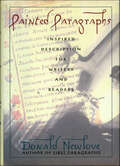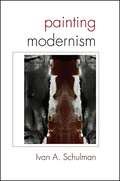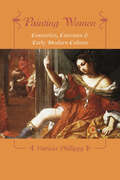- Table View
- List View
Pagan Virtue in a Christian World: Sigismondo Malatesta and the Italian Renaissance
by Anthony F. D'EliaIn 1462 Pope Pius II performed the only reverse canonization in history, damning a living man to an afterlife of torment. What had Sigismondo Malatesta, Lord of Rimini and a patron of the arts, done to merit this fate? Anthony D'Elia shows how the recovery of classical literature and art during the Italian Renaissance led to a revival of paganism.
Page Fright: Foibles and Fetishes of Famous Writers
by Harry BruceA witty round-up of writers' habits that includes all the big names, such as Dickens, Flaubert, Tolstoy, Hemingway. At public events readers always ask writers how they write. The process fascinates them. Now they have a very witty book that ranges around the world and throughout history to answer their questions. All the great writers are here -- Dickens, dashing off his work; Henry James dictating it; Flaubert shouting each word aloud in the garden; Hemingway at work in cafés with his pencil. But pencil or pen, trusty typewriter or computer, they all have their advocates. Not to mention the writers who can only keep the words flowing by writing naked, or while walking or listening to music -- and generally obeying the most bizarre superstitions. On Shakespeare's works: "Fantastic. And it was all done with a feather!" -- Sam Goldwyn. "I write nude, seated on a thick towel, and perhaps with a second towel around me." -- Paul West. "I've never heard of anyone getting plumber's block, or traffic cop's block." -- Allan Gurganus. "I'm a drinker with a writing problem." -- Brendan Behan.
Page One: Inside The New York Times and the Future of Journalism
by Participant Media David FolkenflikThe news media is in the middle of a revolution. Old certainties have been shoved aside by new entities such as WikiLeaks and Gawker, Politico and the Huffington Post. But where, in all this digital innovation, is the future of great journalism? Is there a difference between an opinion column and a blog, a reporter and a social networker? Who curates the news, or should it be streamed unimpeded by editorial influence? Expanding on Andrew RossiOCOs ?rivetingOCO film ("Slate"), David Folkenflik has convened some of the smartest media savants to talk about the present and the future of news. Behind all the debate is the presence of the New York Times, and the inside story of its attempt to navigate the new world, embracing the immediacy of the web without straying from a commitment to accurate reporting and analysis that provides the paper with its own definition of what it is there to showcase: all the news thatOCOs fit to print. "
Page to Screen: Taking Literacy into the Electronic Era (Studies In Education Ser.)
by Ilana SnyderHypertext, e-mail, word processing: electronic technologies have revolutionized textual practices. How does language on screen work differently from language on the page? What new literacy skills are needed and how do we teach them?Page to Screen collects some of the best contemporary thinkers in the field of technology and literacy. They analyze the potential of the new forms of text, the increased emphasis on visual communication, new forms of rhetoric, learning in the age of global communication networks and new approaches to storytelling.Page to Screen is compelling reading for anyone interested in Literacy Education, Language Studies, English, Library Studies, Multimedia and Communication Studies.International contributors include Gunther Kress, Cynthia Selfe, Gail E. Hawisher and Colin Lankshear.
Page to Stage: Developing Writing, Speaking And Listening Skills in Primary Schools
by James CarterAn exciting and creative approaches that links literacy and oracy in a way that children will enjoy. Performing poetry is also proven to boost self-esteem.Includes:* Audio downloadable resources with recordings of published poets and children performing their own work* Activities to develop speaking and listening skills* Model poems from which to work* Guidelines for progressing through the writing and performance process* A three stage model: preparation -- writing -- performing
Pages from the Past
by Carolyn KitchAmerican popular magazines play a role in our culture similar to that of public historians, Carolyn Kitch contends. Drawing on evidence from the pages of more than sixty magazines, including Newsweek, Rolling Stone, Black Enterprise, Ladies' Home Journal, and Reader's Digest, Kitch examines the role of journalism in creating collective memory and identity for Americans. Editorial perspectives, visual and narrative content, and the tangibility and keepsake qualities of magazines make them key repositories of American memory, Kitch argues. She discusses anniversary celebrations that assess the passage of time; the role of race in counter-memory; the lasting meaning of celebrities who are mourned in the media; cyclical representations of generational identity, from the Greatest Generation to Generation X; and anticipated memory in commemoration after crisis events such as those of September 11, 2001. Bringing a critically neglected form of journalism to the forefront, Kitch demonstrates that magazines play a special role in creating narratives of the past that reflect and inform who we are now.
Paideia Program: An Educational Syllabus
by Mortimer J. AdlerPaideia is a holistic approach to life-long learning with roots in ancient Greece.The Paideia Program is based on the belief that the human species is defined by its capacity and desire for learning. The program itself argues for a public education that is at once more rigorous and more accessible.
Pain Killer: An Empire of Deceit and the Origin of America's Opioid Epidemic
by Barry Meier“Groundbreaking . . . the shocking account of the origins of today's opioid epidemic, the creators of this plague, and the way to help stop it.”—Sam Quinones, author of Dreamland: The True Tale of America’s Opiate Epidemic“Prescient . . . a landmark work of investigative journalism.”—David A. Kessler, former commissioner of the Food and Drug Administration and author of The End of Overeating Between 1999 and 2017, an estimated 250,000 Americans died from overdoses involving prescription painkillers, a plague ignited by Purdue Pharma’s aggressive marketing of OxyContin. Families, working class and wealthy, have been torn apart, businesses destroyed, and public officials pushed to the brink. In Pain Killer, Pulitzer Prize–winning New York Times reporter Barry Meier exposes the roots of the most pressing health epidemic of the twenty-first century. Powerful narcotic painkillers, or opioids, were once used as drugs of last resort for pain sufferers. Purdue turned OxyContin into a billion-dollar blockbuster by launching an unprecedented marketing campaign claiming that the drug’s long-acting formulation made it safer to use than traditional painkillers for many types of pain. That illusion was quickly shattered as drug abusers learned that crushing an Oxy could release its narcotic payload all at once. Even in its prescribed form, Oxy proved fiercely addictive. As OxyContin’s use and abuse grew, Purdue concealed what it knew from regulators, doctors, and patients. Here are the people who profited from the crisis and those who paid the price, those who plotted in boardrooms and those who tried to sound alarm bells. A country doctor in rural Virginia, Art Van Zee, took on Purdue and warned officials about OxyContin abuse. An ebullient high school cheerleader, Lindsey Myers, was reduced to stealing from her parents to feed her escalating Oxy habit. A hard-charging DEA official, Laura Nagel, tried to hold Purdue executives to account. The drugmaker’s owners, Raymond and Mortimer Sackler, whose names adorn museums worldwide, made enormous fortunes from the commercial success of OxyContin. In this updated edition of Pain Killer, Barry Meier breaks new ground in his decades-long investigation into the opioid epidemic. He takes readers inside Purdue to show how long the company withheld information about the abuse of OxyContin and gives a shocking account of the Justice Department’s failure to alter the trajectory of the opioid epidemic and protect thousands of lives. Equal parts crime thriller, medical detective story, and business exposé, Pain Killer is a hard-hitting look at how a supposed wonder drug became the gateway drug to a national tragedy.
Painfully British Haikus
by Dale Shaw'Will make everybody laugh' DOLLY ALDERTON ON THE HIGH LOWEnjoy this hilarious collection of over 200 haikus that sum up the complex, confusing and often compounding character of the British people.The Sellotape endUnlocatable it seemsChristmas is cancelledHow many gin tinsIs decreed appropriate For this train journey? The sound of a splashMy Hobnob falls to piecesMy tea is sulliedEvery houseplantSuffers a slow painful deathI am a monsterYou're at the seasideA seagull eyes your MagnumYou won't win that fight
Painless Grammar (2nd edition)
by Rebecca S. ElliottThis very approachable text combines instruction in parts of speech and sentence structure with down-to-earth examples and examination of some of the more amusing and peculiar words in the English language. A chapter on clear e-mail communication and etiquette is brand new in this edition, as are many of the author's challenging "Brain Ticklers." A helpful chapter on how to edit a school paper has also been heavily revised and updated.
Painless Grammar (Barron's Painless)
by Rebecca ElliottBarron&’s makes learning grammar fun and PAINLESS!Painless Grammar transforms dull, dry grammar rules into lighthearted, step-by-step learning and includes:Examples on constructing sentences the right way by using grammar rulesPainless tips, common pitfalls, sample sentences, and instructive tables and sidebars,&“Brain Tickler&” quizzes and answers throughout each chapter, and more.
Painless Grammar (Painless Series)
by Rebecca ElliottCombines instruction in sentence structure with examination of amusing expressions, and gives tips on email communication, editing a school paper, and more. Titles in Barron’s extensive Painless Series cover a wide range of subjects, as they are taught at middle school and high school levels. Perfect for supporting Common Core Standards, these books are written for students who find the subjects somewhat confusing, or just need a little extra help. Most of these books take a lighthearted, humorous approach to their subjects, and offer fun exercises including puzzles, games, and challenging “Brain Tickler” problems to solve. Bonus Online Component: includes additional games to challenge students, including Beat the Clock, a line match game, and a word scramble.
Painless Junior: Grammar
by Tracy Hohn Marciann Mcclarnon Donna Christina OliverioTeachers and students in third and fourth grades will value this instructive and entertaining journey to Grammar World, where kids have fun while they develop their facility in correct English usage. Grammar World is a make-believe amusement park where boys and girls are introduced in chapter one to the animals who teach them about different kinds of sentences: statements and questions, commands and exclamations, subjects and predicates, combining sentences, and how to avoid fragments and run-on sentences. Chapter two takes kids to Grammar World's rides, where they learn about nouns, pronouns, adjectives, and several other parts of speech. Chapter three takes them to the Water Park, where they learn how to use verbs. Chapter four is a dolphin show, and explanation of prepositions, prepositional phrases, conjunctions, and interjections. The fifth and final chapter is a fireworks display, in which kids learn punctuation, capitalization, abbreviations, and other details that will help them write clearly and correctly.
Painless Police Report Writing: An English Guide for Criminal Justice Professionals, Third Edition
by Barbara Frazee Joseph N. DavisWith an emphasis on relevance, this book tailors English instruction to the needs of police training and law enforcement. Taking a building block approach, the first five chapters present English grammar and the last two chapters are devoted to the police report writing process. Each chapter includes practice and review exercises that are taken from the field and assignment material that is geared to law enforcement interests. This edition features sample reports, sample forms and “war stories” that help students see how grammar and writing skills are used in their profession.
Painless Reading Comprehension (Barron's Painless)
by Darolyn "Lyn" Jones Ed.D.Learning at home is now the new normal. Need a quick and painless refresher? Barron&’s Painless books make learning easier while you balance home and school. Reading comprehension gets easier as students learn what kind of reader they are, discover how to keep facts in their head, and much more.Titles in Barron&’s extensive Painless Series cover a wide range of subjects, as they are taught at middle school and high school levels. Perfect for supporting Common Core Standards, these books are written for students who find the subjects somewhat confusing, or just need a little extra help. Most of these books take a lighthearted, humorous approach to their subjects, and offer fun exercises including puzzles, games, and challenging &“Brain Tickler&” problems to solve. Bonus Online Component: includes additional games to challenge students, including Beat the Clock, a line match game, and a word scramble.
Painless Reading Comprehension (Painless Series)
by Darolyn "Lyn" Jones Ed.D.Reading comprehension gets easier as students learn what kind of reader they are, discover how to keep facts in their head, and much more. Titles in Barron’s extensive Painless Series cover a wide range of subjects, as they are taught at middle school and high school levels. Perfect for supporting Common Core Standards, these books are written for students who find the subjects somewhat confusing, or just need a little extra help. Most of these books take a lighthearted, humorous approach to their subjects, and offer fun exercises including puzzles, games, and challenging “Brain Tickler” problems to solve. Bonus Online Component: includes additional games to challenge students, including Beat the Clock, a line match game, and a word scramble.
Painless Reading Comprehension (Painless Series) Third Edition
by Darolyn Lyn" JonesReading comprehension gets easier as students learn what kind of reader they are, discover how to keep facts in their head, and much more. Titles in Barron's extensive Painless Series cover a wide range of subjects, as they are taught at middle school and high school levels. Perfect for supporting Common Core Standards, these books are written for students who find the subjects somewhat confusing, or just need a little extra help. Most of these books take a lighthearted, humorous approach to their subjects, and offer fun exercises including puzzles, games, and challenging "Brain Tickler" problems to solve. Bonus Online Component: includes additional games to challenge students, including Beat the Clock, a line match game, and a word scramble.
Painless Speaking
by Mary ElizabethDesigned for use in middle school and high school classrooms, as well as at home, books in this series transform subjects that are normally dreaded by many students. "Painless" books take light-hearted approaches to their subjects, while addressing topics that classroom texts never get to. "Painless Speaking" explores the uniquely human act of oral communication, including elements in our culture that shape the way we speak. It explores finding one's voice, understanding the basic unit of speech communication (an utterance), learning the art of conversation, reading aloud from fiction and nonfiction texts, and instruction in public speaking, which entails composing, practicing, and delivering a speech. Students will find guidelines for self-evaluation of a public speech.
Painless Spelling (Painless Series)
by Mary Elizabeth M.Ed.A Simon & Schuster eBook. Simon & Schuster has a great book for every reader.
Painless Writing
by Jeffrey StrausserHere is practical advice that transforms essay writing into a satisfying experience for middle school and high school students. The author offers tips in enlivening writing with vivid images, smoothing out sentences, silencing the dull passive voice, and adding rhythm to writing. He also shows how to create a template that students can use when writing research papers for all subjects. In addition, students will find web site references cited throughout the text, which they can access. Brain ticklers (short quizzes) appear throughout the book with an answer key at the back.
Painless Writing (Barron's Painless)
by Jeffrey StrausserBarron's makes writing fun and PAINLESS!Painless Writing provides lighthearted, step-by-step learning and includes:Painless writing techniques with sample writing passages throughoutInstruction on expressing your thoughts clearly, enlivening your writing with vivid images, and avoiding the dull, passive voicePainless tips, common pitfalls, instructive tables,&“brain tickler&” quizzes and answers throughout each chapter, and more.
Painscapes
by Ej Gonzalez-Polledo Jen TarrThis book brings into dialogue approaches from anthropology, sociology, visual art, theatre, and literature to question what kinds of relations, frames and politics constitute pain across disciplines and methodologies. Each chapter offers a unique window onto the notoriously difficult problem of how pain is defined and communicated. The contributors reimagine the value of images and photography, poetry, history, drama, stories and interviews, not as 'better' representations of the pain experience, but as devices to navigate the complexity of pain across different physical, social, and intersubjective domains. This innovative collection provides a new access point to the phenomenon of pain and the materialities, affects, structures and institutions that constitute it. This book will appeal to readers seeking to better understand pain's complexity and the social and affective ecologies through which pain is known, communicated and lived.
Painted Paragraphs: Inspired Description for Writers and Readers
by Donald Newlove"Great description shakes us. It fills our lungs with the life of its author." Painted Paragraphs, the second in a series of inspirational guides for writers and readers, is author Donald Newlove's witty, insightful, and very personal selection of the best descriptive passages in literature. Beginning with Ernest Hemingway's dinner of oysters and wine in A Moveable Feast, Newlove moves on to give us the contents of Mildred's cupboard in Terry McMillan's Mama, Robert Stone's description of a rat-infested tug dump in Outerbridge Reach, Richard Selzer's brilliant anatomy lesson in his memoir Down from Troy, and John Edgar Wideman's mood painting of a tree by his mother's house in the black section of Pittsburgh in "All Stories Are True." Also included are selections from Tolstoy, Proust, Shakespeare, Anais Nin, lots and lots of gorgeous Whitman, and dozens more. This idiosyncratic collection not only celebrates great authors, it explains how they use strokes of moral force and courage to paint the landscapes of their work.
Painting Modernism (SUNY series in Latin American and Iberian Thought and Culture)
by Ivan A. SchulmanPainting Modernism demonstrates the influence of painting and sculpture on the work of the major writers of Latin American modernism. Through his analysis, Ivan A. Schulman, a foundational figure in the field, offers a concise and new interpretation of works by José Asunción Silva, Julián del Casal, Rubén Darío, José Juan Tablada, and José Martí. Traditional critical discourse on modernism has emphasized the nature of this movement in terms of its self-referentiality, fragmentation, elitist/escapist concepts, and subjective notions of cultural and aesthetic authenticity. Schulman breaks from this approach and examines these works as products of subjectively generated social/artistic practices that are inseparable from socioeconomic transformations and the chaotic cultural crises of the modern world.
Painting Women: Cosmetics, Canvases, and Early Modern Culture
by Patricia PhillippyThis original analysis of the representation and self-representation of women in literature and visual arts revolves around multiple early modern senses of "painting": the creation of visual art in the form of paint on canvas and the use of cosmetics to paint women's bodies. Situating her study in sixteenth- and seventeenth-century Italy, France, and England, Patricia Phillippy brings together three distinct actors: women who paint themselves with cosmetics, women who paint on canvas, and women and men who paint women—either with pigment or with words. Phillippy asserts that early modern attitudes toward painting, cosmetics, and poetry emerge from and respond to a common cultural history. Materially, she connects those who created images of women with pigment to those who applied cosmetics to their own bodies through similar mediums, tools, techniques, and exposure to toxic materials. Discursively, she illuminates historical and social issues such as gender and morality with the nexus of painting, painted women, and women painters.Teasing out the intricate relationships between these activities as carried out by women and their visual and literary representation by women and by men, Phillippy aims to reveal the delineation and transgression of women's creative roles, both artistic and biological. In Painting Women, Phillippy provides a cross-disciplinary study of women as objects and agents of painting.

